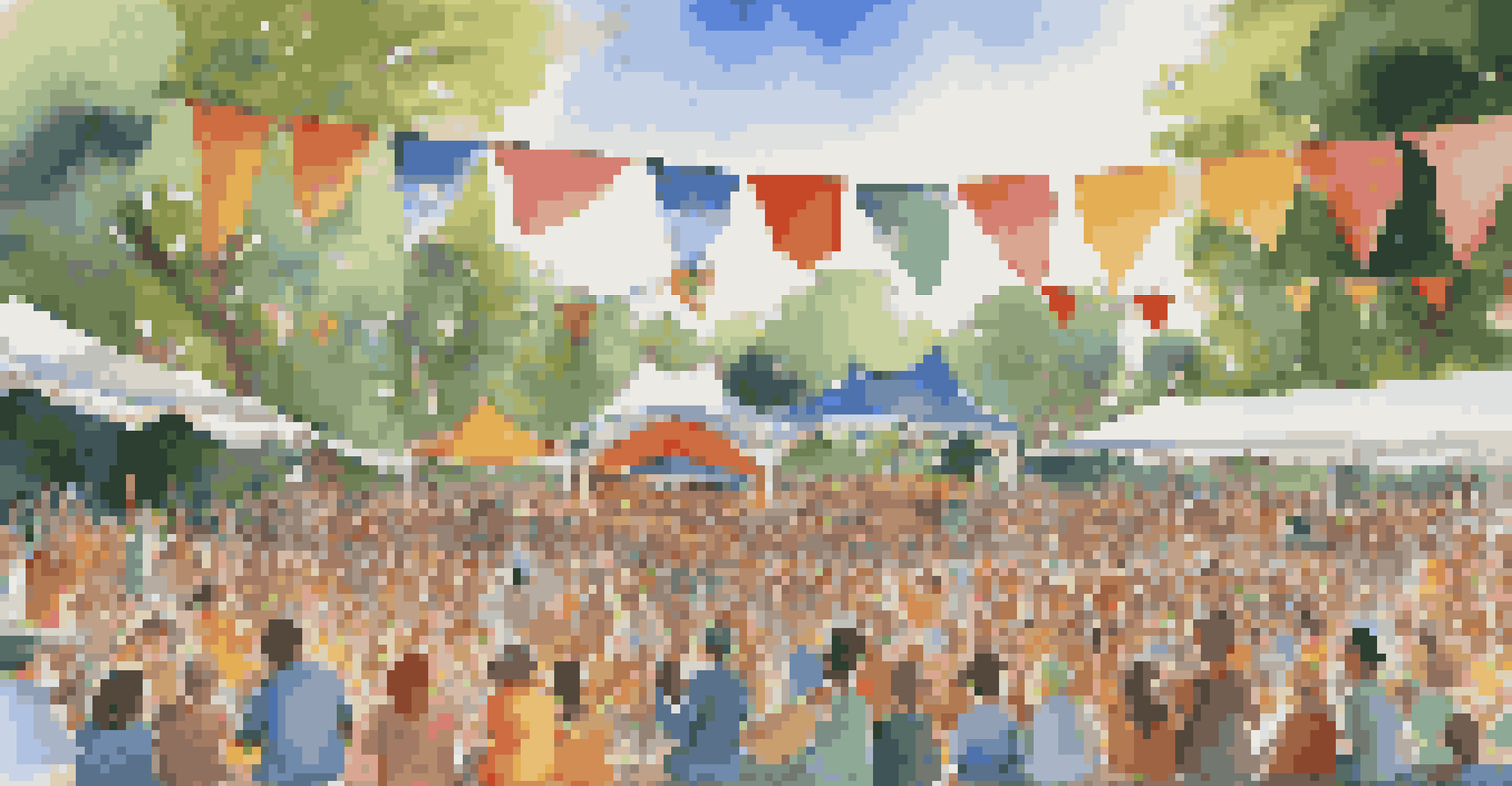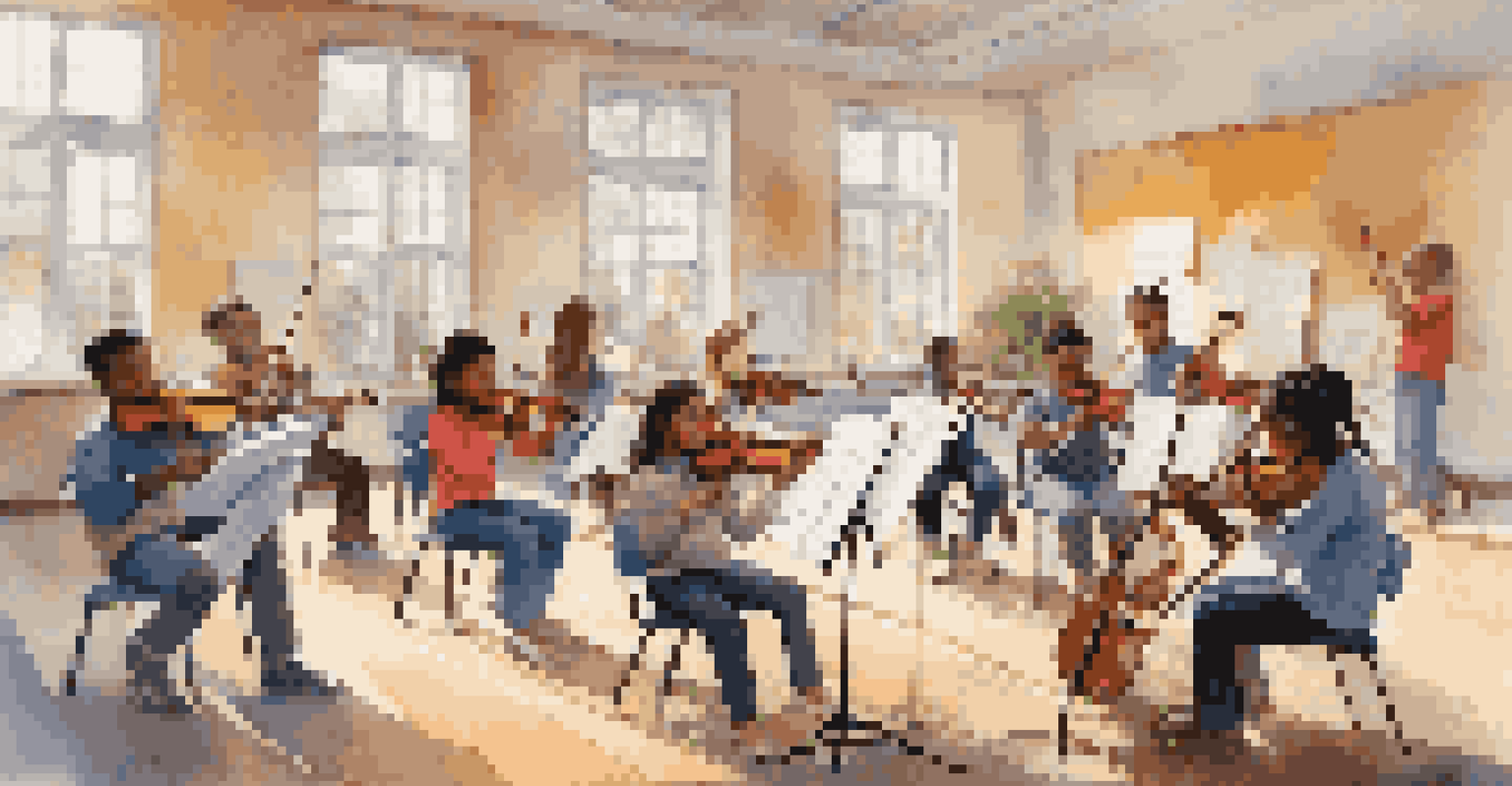The Influence of Music on Community Happiness and Wellbeing

Music as a Universal Language Enhancing Connection
Music transcends cultural boundaries, acting as a universal language that unites individuals. Whether at a festival, concert, or a simple gathering, melodies have an innate ability to foster connections among people. This sense of belonging can be crucial in building a cohesive community where everyone feels welcomed and valued.
Music can change the world because it can change people.
Consider how a local music event can turn strangers into friends through shared experiences. When people sing along to a favorite song, they forge bonds that can last long after the last note fades. This collective experience creates a sense of unity that is foundational to community happiness.
Moreover, participating in music—whether playing an instrument or singing—can enhance feelings of joy and fulfillment. When community members engage in musical activities together, they not only enjoy the art form but also strengthen their relationships, leading to a happier and more connected community.
The Psychological Benefits of Music on Wellbeing
Numerous studies highlight the psychological benefits of music, showing its positive impact on mood and mental health. Listening to uplifting tunes can elevate spirits and reduce feelings of anxiety and depression. In community settings, this can translate to a more positive atmosphere where residents feel happier and more at ease.

Imagine a neighborhood block party where music fills the air. The vibrant sounds can uplift spirits, encouraging laughter and socialization. As people dance and enjoy the rhythm, the stressors of daily life seem to melt away, fostering an environment of joy and togetherness.
Music Unites Communities
Music transcends cultural boundaries, fostering connections and creating a sense of belonging among community members.
Furthermore, engaging with music can stimulate the release of dopamine, the brain's feel-good chemical. This natural boost not only enhances individual wellbeing but also contributes to a collective sense of happiness within the community, making it a more vibrant place to live.
Music as a Tool for Community Engagement and Inclusion
Music serves as a powerful tool for community engagement, inviting diverse groups to come together. Events like open mic nights or community choirs encourage participation from people of all ages and backgrounds, fostering inclusivity. This engagement can help break down barriers and build stronger, more harmonious communities.
Where words fail, music speaks.
For instance, a community center hosting a cultural music festival allows residents to showcase their unique heritage while promoting understanding. Such events celebrate diversity and create opportunities for individuals to learn from one another, strengthening communal ties.
Additionally, when everyone has a voice—whether through performance or audience participation—feelings of belonging are enhanced. This inclusivity not only nurtures individual happiness but also cultivates a sense of community pride, making residents feel invested in their shared environment.
The Role of Music in Celebrating Local Culture
Music is often deeply rooted in local culture, serving as a reflection of community identity. Festivals and events that highlight local artists and genres help preserve cultural traditions while promoting community pride. This celebration of heritage can significantly enhance the overall happiness of community members.
Take, for instance, a local folk music festival that showcases traditional songs and dances. Such events not only provide entertainment but also reinforce cultural values and history, reminding community members of their shared roots. This connection to culture can evoke feelings of nostalgia and belonging, contributing to overall wellbeing.
Psychological Boost from Music
Engaging with music has significant psychological benefits, elevating mood and enhancing overall mental health in community settings.
Moreover, local music can serve as a rallying point for community initiatives. When residents come together to support local musicians, they strengthen their ties to one another and to their community, creating a vibrant, supportive atmosphere that nurtures happiness and connection.
The Impact of Music on Physical Health in Communities
Engaging with music can also have positive effects on physical health, which indirectly contributes to community wellbeing. Activities such as dancing or participating in music-based exercise classes promote physical fitness while bringing people together. This shared activity not only enhances individual health but also fosters a sense of camaraderie among participants.
Imagine a community hosting a dance-a-thon where residents engage in fun, energetic dance routines. This event not only encourages movement but also creates an exciting social atmosphere. As participants laugh and interact, they build relationships and promote a culture of health and happiness within their community.
Additionally, the rhythm and melody of music can stimulate physical responses that enhance overall wellness. When individuals feel good physically, it positively impacts their mental state, contributing to a happier, healthier community overall.
Music as a Medium for Social Change and Awareness
Music has long been a catalyst for social change, raising awareness about important issues and inspiring communities to take action. Songs that address social justice, environmental concerns, or mental health can stir emotions and motivate collective responses. This ability to galvanize communities can lead to greater happiness as residents feel empowered to contribute positively to society.
Consider how protest songs and anthems have historically united people in the pursuit of change. These powerful messages resonate with individuals, encouraging solidarity and shared purpose. When communities rally behind a cause, they foster a sense of belonging and collective strength, enhancing overall wellbeing.
Music Promotes Cultural Pride
Local music events celebrate cultural heritage, reinforcing community identity and fostering shared pride among residents.
Furthermore, music can serve as a vehicle for dialogue about pressing issues. Community gatherings featuring performances can encourage conversations that inspire change, ultimately leading to a more engaged and happier populace.
Creating Music Opportunities for Future Generations
Investing in music programs for youth is essential for cultivating future generations’ happiness and wellbeing. Schools and community centers that offer music education not only teach valuable skills but also encourage self-expression and creativity. This foundation can lead to more fulfilled individuals who contribute positively to their communities.
Imagine a local youth orchestra where children learn to play instruments and collaborate on musical pieces. Such experiences not only foster talent but also instill a sense of teamwork and accomplishment. As these young musicians grow, they carry forward the joy of music into their adult lives, enriching their communities.

Moreover, providing access to music opportunities can help bridge gaps in socioeconomic status. When all children have the chance to engage with music, communities become more equitable and inclusive, leading to a shared sense of happiness and pride across generations.